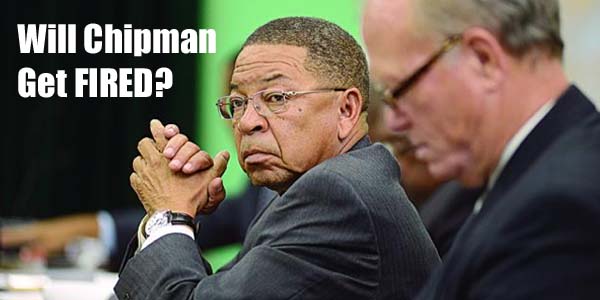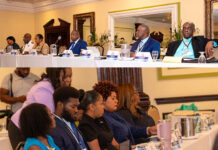BP MORNING BREAKING REPORT >>> Legal Opinion Sent to the House Speaker Dr. Kendal Major this morning proves the Public Accounts Committee has breached the CONSTITUTION!
Hubert Chipman head of the Public Accounts Committee [PAC]
If THE FNM cannot run a Committee how in the hell will they ever run properly the country! BP found this deep in our garbage tin!

READ FOR YOURSELVES THE OPINION FROM LEGAL SCHOLARS
Minute Paper
No.:
Attorney General
& Minister of Legal Affairs
Re: Public Accounts Committee and Audit of Urban Renewal Commission
Introduction
1. The Office of the Attorney-General has been asked to advise generally on several legal and procedural issues arising from the purported exercise of the powers of the Public Accounts Committee (“PAC”) of the House of Assembly (“the House”) to require the attendance of witnesses and the production of documents in aid of its examination of an audit report prepared by the Auditor General (“A-G”) into the financial operations of the Urban Renewal Commission (URC).
2. The main issue that arises for consideration is whether the PAC may summon the co-Chairs of the URC to appear as witnesses in respect of its inquiries and examination related to the said “audit”, notwithstanding that the report on which the investigation is premised has not been tabled or laid in the House of Assembly. Other collateral legal issues which have been raised by the PAC’s actions are also considered and discussed.
3. As will be appreciated, this matter raises fundamental issues relating to parliamentary procedure, constitutional and statutory law, and administrative issues. However, there are importation limitations which frame the consideration of these issues and which must be borne in mind.
4. Firstly, only so much of the factual background that is necessary to inform a proper consideration of the matter is recited here, and what is stated is subject to the caveat that it is based on the information gleaned from various documents which have been generated in respect of this matter. Secondly, the remit of this Opinion is not concerned with the substance of the report, or the accuracy or otherwise of any of the matters contained within the said report. Finally, this Opinion is being produced at short notice, and therefore may be subject to revision based on any additional facts that might be disclosed or any additional documents becoming available that might shed further light on the facts and issues.
Procedural background
5. Apparently, during September to December 2014, the Auditor General, allegedly at the request of the Chairman of the PAC, conducted an audit of the URC, which raised certain issues relating to the expenditure of the Commission. The PAC, apparently with a view to examining the issues raised in the A-G’s report—the contents of which had somehow ended up in the public domain—requested the attendance of and interviewed several members of the Commission. It is not known how the Report came to be disclosed and available to the media, notwithstanding that it had not been tabled or laid before the House, and this is a matter that is worthy of further exploration by the appropriate authority.
6. On the 14th April 2015, letters were issued, apparently under the hand of the Secretary to the Public Accounts Committee, requesting the attendance of the Co-Chairs of the Commission before the PAC on the 16th April 2015. The Co-Chairs responded by letter raising several procedural and other objections to the request (including whether it was reasonable having regard to the short notice), but indicating also that they were willing to address URC matters, once such matters had been properly raised.
Summary of Advice

(i) The PAC, nor its Chairman, has any power to direct or request that the Auditor-General conduct a specific or particular audit of any Government department or other body, and the procurement of an audit at the behest of the PAC/Chairman is contrary to the constitutional functions and special immunity given to the Auditor General under art. 136(5) of the Constitution;
(ii) The PAC’s ability to send for “persons, papers and records” may only be exercised in the performance of its functions, which are confined to examining and reporting on reports or financial statements which have been properly laid before the House pursuant to Constitutional or statutory requirements or the procedural rules of the House (Rule 17(1), Rules of the House of Assembly 2005);
(iii) The report, pursuant to which the PAC purported to exercise powers to send for “person, papers and records”, has in fact not been tabled or laid before the House, and therefore the PAC cannot take cognizance of it, nor exercise any of its investigative powers in respect of it; and
(iv) In any event, even if the PAC were properly exercising its functions to summon witnesses, the letter sent to the co-chairs adopted the wrong form, and should have been in the form of summonses issued pursuant to s.14(1) of the Powers and Privileges (Senate and House of Assembly) Act. (Ch. 8, Statute Laws).
8. For completeness, it should be stated that issues of fairness or natural justice may also arise with respect to the publication of a report containing findings of primary facts which may be critical of, or cast an adverse light on, the URC if the persons primarily affected have not been allowed an opportunity to be heard before any “publication” of the report was made. However, if these issues arise, they are matters to be taken up by the persons whose rights may have been adversely affected thereby. Nothing more can be said on this, as it is not known: (i) whether or to what extent such persons were afforded an opportunity to respond; and (ii) how the Report came to be in the public domain.
The Auditor-General
9. The Auditor General is one of two public officers whose holders are given complete constitutional independence, and who is expressly said to be subject to the control of no person or body in the performance of his functions: article 136 (5) of the Constitution. The functions of the A-G are set out under sub-paragraphs 3 and 4 of article 136. Stated shortly, they are to conduct an annual audit of all departments of Government (including the Judiciary and Parliament) and to submit reports pursuant to the annual audit without undue delay to the Speaker (or Deputy Speaker), who shall “cause them to be laid before the House of Assembly without undue delay.” Further, the A-G is given constitutional security similar to that of holders of high judicial office, and can only be removed from office for inability to exercise the functions of his office (arising either from infirmity of body or mind, or any other cause, or misbehaviour) and then only in accordance with a quasi-judicial process, which requires the appointment of a special tribunal to consider the issue.
10. The functions of the A-G with respect to the auditing of public finances are further fleshed out in the Financial Administration and Audit Act 2010 (Part IV: Accounts and Audits, ss. 32-43), (“FAA Act”). In particular, those sections provide for the statement of financial accounts of all Government Departments to be sent to the A-G for his examination and certification, and repeats the requirement for the A-G to submit his reports on “the statements and accounts which are required to be submitted to him in accordance with [the FAA Act]” to the Speaker for laying before the House.
11. The FAA Act also authorizes the A-G to carry out audits of public departments or “other bodies supported by public funds” (ss. 36 and 37 respectively), or to use the statutory language—to “carry out examination into the economy, efficiency and effectiveness with which any department, authority or other body to whom this section applies, has used its resources in discharging its functions”. The A-G may audit these other bodies “where he has reasonable cause to believe that any authority or body to which this section applies has in any of its financial years received more than half its income from public funds…” (s.37(1)).
12. The URC is a non-statutory body, established pursuant to a resolution/decision of the Cabinet of the Bahamas, although it is understood that legislation is currently being drafted to provide a statutory basis for the re-incarnation of the URC as a statutory authority. Since 2013, the URC has also operated a Foundation which allows the URC to receive private donations, but it is indisputable that the majority of the income or funds used by the URC are public funds, which have apparently been allocated under the budget of the Ministry of Works and Urban Development. Thus, the URC is a body that would be susceptible to being audited by the A-G at his discretion, either as a body primarily funded by public funds or as an emanation of the Executive.
13. What is clear, however, is that both the constitutional and statutory provisions which provide for how the A-G is to carry out his auditing functions, does not provide for the A-G to act on the instructions of the PAC—or any other body for that matter—although there are statutory functions accorded to the Treasurer and Minister of Finance under the FAA Act as part of the process for the control of public finances. As will be explained later, the role of the PAC is limited to examining and reporting on reports that the A-G puts before the House, or which have been referred to the Committee by the House. For the PAC or its Chairman to specifically commission such an audit (as has apparently been acknowledged by the PAC Chairman) seems to be a trespass on the constitutional and statutory functions of the A-G, and a violation of the separation of powers doctrine.
14. The constitutional position of the Auditor-General is illustrated in a Privy Council case on appeal from Grenada, which concerned an appeal against the removal of the Director of Audit of Grenada (the comparable constitutional position to the Auditor General). The Privy Council noted the “constitutional importance of the office of Director of Audit” and stated that the Director “must act as a watchdog on behalf of the public to guard against any impropriety in the conduct of the public finances of Grenada.” The Board said further that:
“The protection against arbitrary or unjustified removal from office that these provisions provide underlines the undoubted constitutional importance that the Director of Public Prosecutions and the Director of Audit, in their discharge of their respective functions, should be independent of the executive. No doubt, similar protection is, for the same reasons, provided to judges…”.
15. Thus, the PAC, or its Chairman, would be stepping outside of its constitutional and prescribed functions to specifically commission an audit, and would be a violation of the independence of the Auditor General’s functions.
The PAC
16. A useful starting point for an inquiry into the powers of the PAC is the historical commentary on the rationale for the PAC contained in the Manual of Procedure in the Business of the House of Assembly, 3rd edition 1964. The Committee was first appointed by a resolution of 1913 as a standing committee “[f]or the examination of the accounts showing the appropriation for the sums granted by the Legislature to meet the public expenditure of the Colony….” (S.O. 70). Its role is further amplified by the commentary at S.O. 169, which bears setting out in full:
“The Public Accounts Committee is the means the Opposition may use to question the Government of the day on the state of Public Accounts. It is therefore important that there be an annual report from the Public Accounts Committee to which a minority report can be attached. As it has been the practice of the Speaker in recent years to appoint committees in proportion to the representation of the various parties in the House this will ensure that a minority party or independents will always be represented on the Public Accounts Committee and therefore have access to such material as the Auditor may have available or to any other financial accounts. In order that any possible misuse of funds may be brought to the attention of the Public, the Opposition must be constitutionally able to air the question. Therefore, the Public Accounts Committee report is mandatory.
The Auditor shall submit his report on all accounts for all sections of the Government to the Speaker of the House, who shall cause them to be laid on the table of the House. The report shall be referred to the Public Accounts Committee. (See Constitution, section 118, subsections (1) and (2)).” [Emphasis supplied.]
17. The House of Assembly Rules of Procedure 2005, (“2005 Rules of Procedure”) do not retain the commentary that was in the 1964 Rules, but the new rules continues the pre-eminence of the Opposition members on the PAC, and provide for the Opposition members to constitute the majority of the five-member Committee (Rule 17(3)).
Powers of Committees to send for “persons, papers and records”
18. With respect to the production of papers and records, the editors of the leading text on Parliamentary Procedure—Sir Erskine May’s Parliamentary Practice—makes the following observation: “A select committee cannot require the attendance of witness or the production of documents without express authority from the House. Thus, it is usual in the appropriate Standing Order, or in the order relating to its appointment, or subsequently on the motion of the chairman, to give a select committee the power to send for persons, papers, and records.” Where the power is granted, witnesses may be summoned to attend the committee and bring with them documents that they are informed will be required for the use of the committee, subject to certain qualifications.
19. Prior to the 2005 Rules of Procedure, the PAC and other “sessional committees” were not specifically granted powers to request witnesses or documents, although they could exercise this power by means of an authorizing resolution by the House which constituted the Committee. In fact, this principle is given legislative expression in the Powers and Privileges (Senate and House of Assembly) Act (Ch. 8), the relevant provisions of which are set out below.
“14(1). Where the attendance of any person is required to give evidence before a Chamber or a committee with regard to any matter, the President or the Speaker, acting upon the resolution of the Chamber in question or, in a case where such evidence is required to be given before a committee, upon the resolution of the committee transmitted through the chairman of such committee, shall inform the Clerk accordingly, and the Clerk shall issue a summons under his hand requiring the attendance of such persons at a time and place to be specified in such summons to give evidence of the facts appertaining to such matter or to produce any written or other evidence in his custody.
Provided that no such summons may issue to require the attendance before a Chamber or a committee thereof of a member of the other Chamber;
Provided further that a committee may not require the attendance of witnesses or the production of documents without express authority from the Chamber by which it is appointed signified by resolution.” [Emphasis supplied.]
Note, also, that s. 2 (Interpretation) of the said Act defines “committee” to include any committee of the Senate and any standing or sessional or select Committee of the House.” The PAC is now a standing committee, which would be caught by this legislation.
20. The position with respect to the power to call witness and send for documents changed with the 2005 Rules of Procedure, and the new rules provide for these standing committees to be invested with such investigative powers. Rule 17(5) of the 2005 Rules provide for the PAC to have power to “require the attendance of witnesses or the production of documents.” Notwithstanding the principle that Parliament is the master of its own procedure, Parliament is constrained by the law of the land, and where its procedure has been regulated by statute that statute prevails. Thus, in any event, and irrespective of any other issue arising in this matter, in order for the PAC to properly exercise its power to call for witnesses, the procedure ordained by s.14 (1) must be followed. Thus, to the extent that the PAC has proceeded to call or examine witnesses by simple request only and have issued letters of request to the co-chairs, that procedure is
procedurally improper and contrary to statute.
Whether powers may be invoked where no report has been tabled before the House
21. There can be no gainsaying that the PAC has the power to send for witnesses and documents in the performance of its functions. However, it must be appreciated that these powers are granted to enable the Committee to carry out its work, and must be read subject to the functions of the PAC, which have been specifically prescribed by the House. Those functions are to examine and report on the following (R. 17(1)):
“(a) the accounts showing the appropriation of the sums granted by Parliament to meet the public expenditure;
(b) such other reports, accounts or financial statements of Ministries, Departments and Public Corporations before the House as the Committee may think fit;
(c ) such other accounts as may be referred to the Committee by the House or under any other law;
(d ) the report of the Auditor General.”
22. It may be presumed that an audit or report on the URC will likely come under category (b), (c) or (d) of the documents or reports set out at Rule 17(1), on which the work of the Committee is based. Obviously, such a report does not come within Category A, which deals with appropriations. Category “b” requires the other reports, accounts or financial statements to be before the House (emphasis supplied) and therefore anticipates that they will be properly laid. Category “c” speaks to accounts which have been referred to the Committee by the House, or under statutory law. We are not aware that this matter has been referred to the Committee by the House, or has been submitted by virtue of any law. Category “d” deals with the Auditor-General’s report, again which has to be formally submitted to the Speaker pursuant to art. 136(4) of the Constitution (and s. 43 of the Financial Administration and Audit Act) and laid before the House.
23. Thus, it may be seen that in all cases, the work of the PAC is predicated on documents or accounts that have been duly laid before Parliament. The attempted exercise of powers in circumvention of this process, and in the absence of being specifically empowered by the House by Resolution to investigate a matter and utilize its investigatory powers for that purpose, would be irregular and contrary to statute and the House Rules. As far as we are aware, the Auditor General’s Report on the URC has not been formally tabled or laid in the House pursuant to any of the statutory processes by which the A-G may put reports or other documents before Parliament.
24. Rule 82 of the 2005 Rules of Procedure deals with how papers and documents are to be laid in the House, and in all cases it envisages a submission to the Speaker, who orders that the document be laid. (For historical and comparative purposes, it might also be pointed out that S.O. 181 of the 1964 Manual sets out the circumstances under which “accounts and papers are presented to the House or laid on the table of the House” as follows: (a) by command of the Governor, (b) under the provisions of an Act, (c) by an order of the House, (d) in consequence of a message from the House to the Governor, (e) by the Speaker and (f) by the Auditor through the Speaker.”) [Emphasis supplied.]
Conclusion
25. As indicated in the summary above, and for the reasons stated herein, the purported course of action taken by the PAC with respect to the exercise of its powers to summon witnesses is procedurally and legally improper having regard to the fact that the said audit in respect of which the PAC is presuming to call witnesses has not been laid before the House, and the failure to follow the statutory process prescribed at s. 14(1) for summoning such witnesses. Further, the process by which the said audit has apparently been commissioned, may have undermined the constitutional independence of the A-G and engaged a violation of the separation of powers doctrine.
Office of the Attorney-General
21 April 2015








